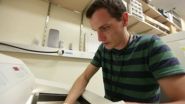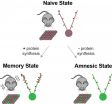Genetically elevated triglyceride level associated with protection against type 2 diabetes
2015-05-28
(Press-News.org) Elevated plasma triglyceride level is considered a risk factor for type-2 diabetes, but new findings suggest that a genetically-elevated triglyceride level is associated with protection against type-2 diabetes. Yann Klimentidis, an Assistant Professor at the Mel and Enid Zuckerman College of Public Health at the University of Arizona, and colleagues found that triglyceride-increasing alleles are associated with decreased type-2 diabetes incidence. Their findings were published recently in PLOS Genetics.
Building on previous studies that hinted to the same association, Klimentidis and colleagues tested the relationship of triglyceride-associated genetic variants, collectively and individually, with type-2 diabetes incidence across three prospective cohort studies comprised of European- and African-American participants.
Their findings across studies, racial groups, and statistical models consistently demonstrate that triglyceride-increasing alleles are associated with decreased type-2 diabetes incidence. The studied genes therefore appear to both increase triglyceride levels and decrease type-2 diabetes risk. Although no single gene appeared to be driving this trend, several, including a variant near the APOA1 gene, stood out as potentially interesting to this finding.
Although more work is needed to fully understand the physiological mechanisms that underlie these genetic associations and to further elucidate the causal relationship between triglycerides and type-2 diabetes, these findings are a promising start to our understanding of triglyceride-associated genes and their relationship with type-2 diabetes.
INFORMATION:
COMPETING INTERESTS: The authors have declared that no competing interests exist.
CITATION: Klimentidis YC, Chougule A, Arora A, Frazier-Wood AC, Hsu C-H (2015) Triglyceride-Increasing Alleles Associated with Protection against Type-2 Diabetes. PLoS Genet 11(5): e1005204.doi:10.1371/journal.pgen.1005204
Disclaimer
This press release refers to an upcoming article in PLOS Genetics. The release is provided by journal staff, or by the article authors and/or their institutions. Any opinions expressed in this release or article are the personal views of the journal staff and/or article contributors, and do not necessarily represent the views or policies of PLOS. PLOS expressly disclaims any and all warranties and liability in connection with the information found in the releases and articles and your use of such information.
About PLOS Genetics
PLOS Genetics reflects the full breadth and interdisciplinary nature of genetics and genomics research by publishing outstanding original contributions in all areas of biology. All works published in PLOS Genetics are open access. Everything is immediately and freely available online throughout the world subject only to the condition that the original authorship and source are properly attributed. Copyright is retained by the authors. The Public Library of Science uses the Creative Commons Attribution License.
About the Public Library of Science
The Public Library of Science (PLOS) is a non-profit organization of scientists and physicians committed to making the world's scientific and medical literature a freely available public resource. For more information, visit http://www.plos.org.
ELSE PRESS RELEASES FROM THIS DATE:
2015-05-28
Dany Gaillard and colleagues at the University of Colorado Anschutz Medical Campus have discovered a key molecular pathway that aids the renewal of taste buds, a finding that may help cancer patients suffering from an altered sense of taste during treatment. Their findings were published recently in the journal PLOS Genetics.
"Many cancer drugs which circulate throughout the entire body, will target a tumor but in the process affect healthy cells," said the study's senior author Linda Barlow, a professor of cell and developmental biology at University of Colorado Anschutz ...
2015-05-28
AURORA, Colo. (May 28, 2015) - Researchers at the University of Colorado Anschutz Medical Campus have discovered a key molecular pathway that aids in the renewal of taste buds, a finding that may help cancer patients suffering from an altered sense of taste during treatment.
"Many cancer drugs, which circulate throughout the entire body, will target a tumor but in the process affect healthy cells," said the study's senior author Linda Barlow, PhD, professor of cell and developmental biology at CU Anschutz. "That in turn will alter a person's sense of taste leading to ...
2015-05-28
CAMBRIDGE, MA -- Memories that have been "lost" as a result of amnesia can be recalled by activating brain cells with light.
In a paper published today in the journal Science, researchers at MIT reveal that they were able to reactivate memories that could not otherwise be retrieved, using a technology known as optogenetics.
The finding answers a fiercely debated question in neuroscience as to the nature of amnesia, according to Susumu Tonegawa, the Picower Professor in MIT's Department of Biology and director of the RIKEN-MIT Center at the Picower Institute for Learning ...
2015-05-28
This news release is available in Japanese.
Long-held social biases can be reduced during sleep, a new report suggests. It adds further support to recent research that has shown that memories can be selectively reactivated and strengthened during slumber. Scientists have known that sleep boosts memory formation by resuscitating faint neuron activity shaped during earlier periods, when an individual was awake. This process can be experimentally stimulated by giving a sleeping individual cues related to an earlier period of learning. Now, Xiaoqing Hu and colleagues ...
2015-05-28
This news release is available in Japanese. Xiaochun Qin and colleagues have provided a high-resolution crystal structure of a plant protein supercomplex critical to photosynthesis, shedding new light on how this extremely effective solar energy converter achieves its impressive performance. The photosynthesis of many plants relies upon the large light-harvesting complex I (LHC1), which surrounds photosystem I (PSI) and captures sunlight. LHC1 is able to transfer the energy it absorbs to the PSI core, where it is converted into chemical energy with close to 100% efficiency. ...
2015-05-28
This news release is available in Japanese.
Memories that have been destabilized and forgotten by mice can nevertheless be retrieved by activating memory engrams, or specific patterns of neurons that fire when memories are encoded, with light, researchers say. These findings provide fresh insight into memory consolidation, or the process by which new, unstable memories transform into stable, long-term memories. Until now, researchers have wondered whether memory consolidation was dependent upon the stabilization of these memory engrams. But Tomás Ryan and colleagues ...
2015-05-28
This news release is available in Japanese.
Armadas of icebergs that broke off the Greenland ice sheet into the northern Atlantic Ocean during the Last Glacial Period -- between about 110,000 and 12,000 years ago -- often increased methane production in the tropics, according to a new study. These findings illustrate how high-latitude events can influence tropical climate conditions, and they hint at the underlying mechanisms of abrupt climate changes. Such massive discharges of icebergs into the Atlantic are known as Heinrich Events, and researchers have wondered for ...
2015-05-28
CHICAGO --- HIV has a voracious sweet tooth, which turns out to be its Achilles' heel, reports a new study from Northwestern Medicine and Vanderbilt University.
After the virus invades an activated immune cell, it craves sugar and nutrients from the cell to replicate and fuel its wild growth throughout the body.
Scientists discovered the switch that turns on the immune cell's abundant sugar and nutrient pipeline. Then they blocked the switch with an experimental compound, shutting down the pipeline, and, thereby, starving HIV to death. The virus was unable to replicate ...
2015-05-28
Zoonotic malaria has been shown to be caused by two genetically distinct Plasmodium knowlesi parasite subpopulations associated with different monkey host species in Malaysia, according to new research published in PLOS Pathogens. The authors believe this could have important implications for how the parasite adapts and spreads in humans.
Plasmodium knowlesi is a zoonotic malaria parasite which is common in forest-dwelling macaques. In recent years, increasing numbers of cases of knowlesi malaria have been reported in humans. The disease is now the most common form of ...
2015-05-28
Different people can vary substantially in their genetic susceptibility to viruses, including HIV. Although the biology that underlies this variation in humans is still being uncovered, it seems that we may be able to learn some key lessons from our closest cousins. A gene variant in chimpanzees in a Tanzanian wildlife preserve probably protects them from rapidly succumbing to the primate equivalent of HIV, Stanford University School of Medicine scientists report in the open access journal PLOS Biology, publishing May 28.
The wild chimps inhabit Gombe Stream National ...
LAST 30 PRESS RELEASES:
[Press-News.org] Genetically elevated triglyceride level associated with protection against type 2 diabetes


